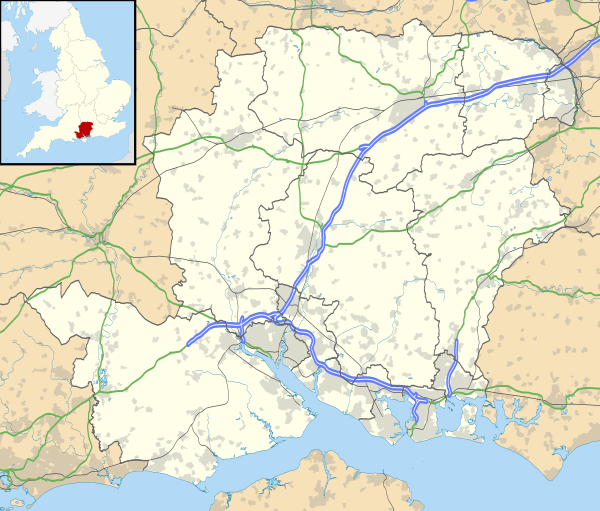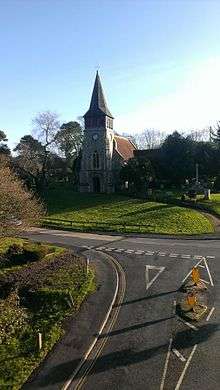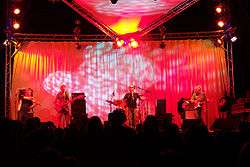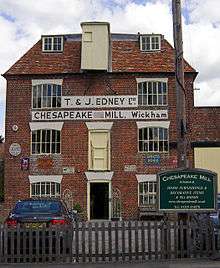Wickham, Hampshire
Wickham (/ˈwɪkəm/) is a small village and civil parish in Hampshire, England, about three miles north of Fareham. At the 2001 census, it had a population of 4,816, falling to 4,299 at the 2011 Census.[1]
| Wickham | |
|---|---|
 Wickham Location within Hampshire | |
| Population | 4,816 (2001) 4,299 (2011 Census including Knowle)[1] |
| OS grid reference | SU572115 |
| District | |
| Shire county | |
| Region | |
| Country | England |
| Sovereign state | United Kingdom |
| Post town | FAREHAM |
| Postcode district | PO17 |
| Dialling code | 01329 |
| Police | Hampshire |
| Fire | Hampshire |
| Ambulance | South Central |
| UK Parliament | |
Wickham has a wide and well-proportioned square lined with historic buildings and is designated a conservation area.[2][3]
It was the fording place of the River Meon on the Roman road between Noviomagus Regnorum (Chichester) and Venta Belgarum (Winchester), and the inferred divergent point of the route to Clausentum (Bitterne). The Roman road from Wickham to Chichester is still followed today by local roads, passing behind Portsdown Hill to the north of Portsmouth Harbour and then onwards via Havant. In contrast, the route to Winchester is mostly likely lost through neglect in the Dark Ages, before present field patterns emerged.
There have been a reasonable number of sites identified nearby associated with Romano-British industry. These have mainly been pottery kilns focused around the limit of navigation of the River Hamble, near Botley. It is also here that a ford on the Clausentum road has been identified.
Wickham has occasionally been hypothesised as an alternative to Nursling (on the River Test) or Neatham (near Alton) for the Roman station Onna listed in the Antonine Itinerary. However, no definite location for Onna has been determined.
It was the birthplace of William of Wykeham, founder of Winchester College and New College, Oxford.[4]
The Admiralty Shutter Telegraph Line had a station at Wickham.
The village was an intermediate station on the Meon Valley Railway, a late Victorian route, until the line closed in 1955. At one time this railway was conceived as a direct route from London to the Isle of Wight. The closed line is now established as a cycle path and bridleway along the valley of the River Meon.
A traditional gypsy horse fair is held annually every 20 May, or another day if a Sunday, in the village square.
History
Early settlements
The Romans established a settlement at Wickham, on the road from the Roman centres of Chichester and Winchester. Iron works have been found northeast of the village, and various Roman finds to the southwest.
It was in Saxon Britain that the first written mention of the village appears, in a Royal Charter document dated 826. Recent excavation (1965–70) at the Manor House showed its grounds had dwellings and huts, evidence of Saxon settlement.
Post-Norman Conquest
After the Norman Conquest, King William granted the Manor of Wickham to Hugo de Port and the Village appeared in the Doomsday Book of 1086, as part of the Titchfield Hundred. The present church of St Nicholas dates from 1126 and was run by the Canons of Titchfield. In 1269, King Henry III granted a charter to Roger de Scures, the Lord of The Manor at the time, for markets to be held on a Thursday. It is from this time that the layout of the village as we now know it began to emerge.[5] Wickham also had a fair which attracted buyers and sellers from a wide area. Wickham fair (often referred to Wickham Horse Fair) is still held each year on 20 May.[6]

The Church of St Nicholas in Wickham was built in the early 12th century (although there has probably been a church on the site since the 7th century when the people of Hampshire were first converted to Christianity), however the church was largely rebuilt in the 19th century.[7]
Industrialisation and Victorian Wickham
In the 18th century, there was a tanning industry in Wickham and in the 18th and 19th centuries a brewing industry. Both needed a supply of fresh water, which was readily available from the River Meon. In 1801, Wickham had a population of 901 and compared to most of the villages in Hampshire it was a large community. In 1820, Chesapeake Mill was built with timber taken from an American ship USS Chesapeake, which was captured in the War of 1812. Sir Richard Grindall who commanded HMS Prince at the battle of Trafalgar is buried in Wickham churchyard.[8]
In 1903, a branch railway was built from Fareham through Wickham, to Droxford and Alton. It was closed to passengers in 1955 and the line converted to a footpath. The original station platforms can still be found.
In 1978, Wickham was twinned with the French village of Villiers-Sur-Mer. Wickham Vineyard opened in 1984.
In 1990, an old brewery and village hall in Wickham were converted into flats called Riverside Mews. The brewery shut in 1910 and the buildings were given to Wickham Parish Council to use as a village hall.[9]
Culture and events
Wickham Festival

Farmland north of Wickham serves as the venue for the award-winning[10] Wickham Festival, which is an annual 4-day music event. The first Wickham Festival was held from 3–6 August 2006 in the Community Centre and environs. Artists performing included Daby Blade from Senegal, Spiers and Boden, Los Pacaminos, Richard Thompson, Shooglenifty, Sparks, Oysterband, Fiddlers' Bid, Osibisa, Flook, Steeleye Span and The Larry Love Showband.
After briefly moving to Stokes Bay in 2008 and 2009, the festival returned to Wickham in 2010, where it has remained ever since.[11] Wickham Festival has expanded over the years, and has featured performances from such artists as James Blunt, 10cc, Wilko Johnson, The Proclaimers, KT Tunstall, Hugh Cornwell and Lightning Seeds.[12]
Taste Of Wickham
Taste of Wickham is a food festival, first held in Wickham's medieval square in 2014. The festival offers local produce, barbecues, tasters and cookery demonstrations, and has attracted crowds of over 4,000 people to the village.[13] Taste of Wickham returned in 2015, with increased numbers of stalls, crafts and musical displays.[14]
Wickham horse fair
England's biggest and oldest horse fair takes place in Wickham on 20 May every year. It is one of just two major horse-trading events in the country and can trace its history back to the 13th century. Ever since, crowds have gathered annually in the village to trade secrets, meet with friends and parade their stock. The fair includes bareback parades with ponies decorated with ribbons.[15]
Wickham Charity Beer Festival
Originally started by the community centre, after the first year the beer festival was handed to a group who have kept it going until the end of 2019 where it now is being handed back the community centre. The beer festival picks a couple of charity to donate too for each event, there are usually two events a year, one near the beginning or middle of April which is a two day festival and then in October near the beginning or middle of October for one day.
Shopping
Wickham's village square has bars, restaurants, shops and hotels. Bay Tree Walk is a shopping walk. The Chesapeake Mill is a former water mill which is a retail centre.
Sport and leisure
Wickham has a community centre "Wickham Community Centre".
Wickham has a tennis club. The village has a public skatepark and a floodlit astroturf pitch located behind the Community Centre.
The Meon Valley Railway Line is a 17.5 km (11 mi) recreational bridleway that runs through the village. The trail follows part of the bed of the former Meon Valley Railway (Alton to Fareham), which closed in 1968. It ends at West Meon due to removal of the former viaduct across the Meon Valley, and the presence of tunnels further north.
Notable people
See also
- Wickham Railway Station
- William of Wykeham
References
| Wikimedia Commons has media related to Wickham, Hampshire. |
- "Civil Parish population 2011". NeighbourhoodStatistics. Office for National Statistics. Retrieved 21 December 2016.
- Archived 25 September 2006 at the Wayback Machine
- Archived 25 September 2006 at the Wayback Machine
- "Biography of William of Wykeham (1324–1404), Bishop of Winchester". Britannia.com. Retrieved 28 June 2013.
- "History".
- "Wickham Horse Fair".
- "St Nicholas, Wickham - Portsmouth Diocesan Website".
- "A History of Wickham, Hampshire".
- "Brewery History Society Hampshire Wickham Brewery Co Ltd".
- "Kilimanjaro Live named National Promoter of the Year | News | Music Week".
- http://www.portsmouth.co.uk/news/local/wickham-festival-to-return-with-the-levellers-1-1245668 | Portsmouth News | Wickham Festival To Return with the Levellers
- "Wickham Festival".
- "Thousands visit Taste of Wickham Festival".
- "Taste of Wickham 2015".
- "Historic Wickham horse fair starts today".
- "Kellett-Bowman, Dame (Mary) Elaine, (8 July 1923–4 March 2014)", Who Was Who, Oxford University Press, 1 December 2007, doi:10.1093/ww/9780199540884.013.u22750
- Sharp, Thomas (1946) The Anatomy of the Village, Harmondsworth, Middlesex: Penguin


.svg.png)